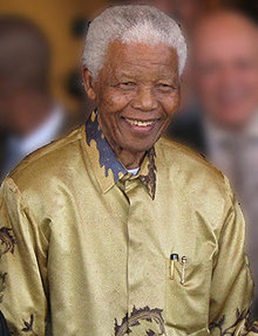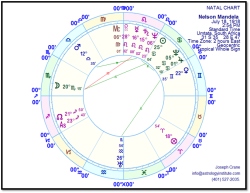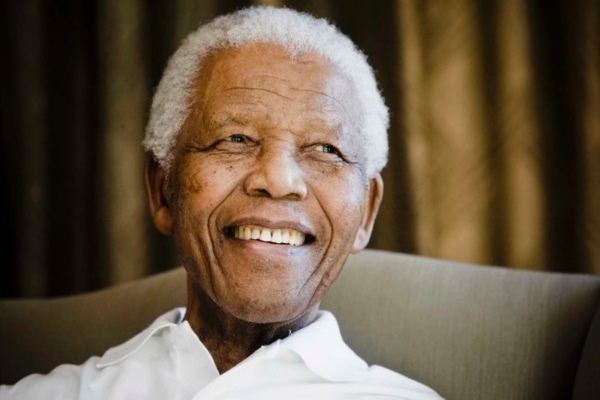By: Joseph Crane
Earlier this summer Nelson Mandela was hospitalized, was repeatedly placed in critical condition, and released from his hospital to go home. No news for month. Then, as the world found out quickly, on Thursday December 5 he finally departed from this life.
International media was well prepared for his death, and the press coverage has had carpet bombing dimensions. Saying goodbye to Mandela has become a major international event and most national leaders will be on hand for his memorial service this week. Now is the perfect time to look at his life and his astrology. First a little biographical background is helpful.
Back in the mid-1960s one of my classes in elementary school was geography. Studying Africa, I learned about the new post-colonial reality on the continent: many of the European powers had relinquished control over their African colonies and there had been other successful movements by blacks to overthrow their white colonists. I also learned that South Africa was different from the others. Not only was the country dominated by a white government but they had a policy of apartheid through which blacks were isolated in designated “homelands” and had no political or economic power within their mineral-rich and potentially prosperous country.
I do not recall back then knowing about Nelson Mandela and his imprisonment for life. The South African government had become increasingly harsh and rigid. The African National Congress, the group in which Mandela was a leader, had been moving toward more violent and confrontative approaches, and Mandela had previously gone abroad for military training. At the age of 9 and in the sixth grade I wasn’t particularly following this story.
 As the next decades passed, South African became one of the world’s great problem places. The white government and society became even more rigid and repressive; increasing political violence and many black deaths rendered South African a pariah state internationally.
As the next decades passed, South African became one of the world’s great problem places. The white government and society became even more rigid and repressive; increasing political violence and many black deaths rendered South African a pariah state internationally.
By the 1980’s the end of apartheid has become an international cause célèbre. Resulting sanctions on South African had cost them billions of potential revenue; the country had also been excluded from most international cultural and sports occasions.Nelson Mandela’s release from prison became part of the campaign against apartheid. Although he had not been seen in public since 1964, he had become a world figure.
On the other side was the South African government that was trying to find a way out of this increasingly untenable situation. During this time there had been secret negotiations between Mandela and the South African President P.W. Botha, but they had proved unsuccessful – the South African leader had imposed too many preconditions. In 1989 the new President F.W. de Klerk desired to significantly reform – if not dismantle – apartheid. He needed a leader from the other side to negotiate with and the solution was obvious, so in early February 1990 Mandela was unconditionally released from prison. Mandela’s departure from prison was televised internationally and billions of people – including me – watched the occasion. Mandela was 71 years old then and had been imprisoned for 27 years.
What happened over the next several years was remarkable. The path of negotiation was difficult and marred by violence, yet in 1994 a multi-racial election selected Mandela over F.W. de Klerk and he took over the nation’s leadership. Over the next five years as his country’s leader, Mandela succeeded in dismantling apartheid as a legal system and brought the races closer together without violence and a cycle of revenge. He had the difficult task of reassuring whites while addressing the growing expectations of black South Africans.
Some of Mandela’s moves were symbolic but were nonetheless important. South Africa’s re-entry into the world of international sports competition culminated in the rugby championship with his country as host. Mandela supported the formerly all-white rugby team in its emergence into a national team. (See the 2009 film Invictus for detail and for a good movie.) More directly, Mandela also established the Truth and Reconciliation Commission which traded amnesty for full disclosure of previous crimes during the apartheid era. This allowed the process to change to go forward without cycles of revenge. It has become a model for other nations in similar situations.
During his time Mandela had sought to improve the cultural, economic, and educational conditions for the country’s black majority. He made some progress although this long project still continues. His work on the cause of treating and eradicating AIDS had to wait until the end of his Presidency, after one of his sons died from the disease.
He has won as many humanitarian awards as can be won (including a Nobel Prize with F.W. de Klerk in 1993) and his international reputation is unparalleled. His place in history as an inspirational political figure is assured.
The Astrology
With all these things in mind, let’s look at his birth chart, or should we say, a birth chart.
The best we know is that Mandela was born in the afternoon, although we are not completely sure of the date itself. This chart has been rectified by the well-known astrologer Noel Tyl who has significant ties with South Africa. I am not complexly happy with this chart, but I will use here, for there a few things I really like about it.
 Click chart at left to open in new window.
Click chart at left to open in new window.
We begin with the Ascendant, of course. We know the usual connotations of Sagittarius – adventurous, visionary, and tuned into ideas – but this can take us only so far. We need to look at many other factors.
We can also note the presence of the North Node conjunct the Ascendant. Unlike some other astrologers, I do not use the North Node as a karmic position – what in the birth chart is not a karmic position? Instead I follow the traditional teaching that considers the North Node a factor of enhancement: since the Ascendant is an index of personal presence this may argue for Mandela’s strong personal impact.
We look at the domicile lord of Sagittarius and there is Jupiter exalted in Cancer. Jupiter in Cancer combines Jupiter’s interest in the “big picture” with Cancer’s ability to make things personal. Jupiter is strong in other ways – it is in sect and is oriental to the Sun (rising in the East before sunrise).
Astrologers who use a quadrant house system (e.g., Placidus, Koch) may find Jupiter in the Seventh Place, not the Eighth. For a man who spent twenty-seven years in prison, I am not surprised by seeing the Sun and Moon along with the ruler of the Ascendant in Mandela’s Eighth and Twelfth Places. It well befits someone whose calling required had a great personal sacrifice; the chart of a fortunate man would not be that of Nelson Mandela.
We are still discussing his Ascendant but I need to bring in a seemingly-unrelated factor. Jupiter conjunct Pluto well fits someone who would have a transformational impact on his nation, yet many people have this configuration and by itself this conjunction does not argue for his unique path. But when we look more closely to the degree of this Ascendant, 23° and 43 minutes of Sagittarius, this closely connects to Pluto at 5° and minutes of Cancer are by equal-power, contra-antiscia, or symmetrical to 0° Aries/Libra – take your pick how to talk about it. The involvement of the Ascendant makes personal Mandela’s Jupiter-Pluto conjunction. This factor has helped me acquiesce to Tyl’s rectified birth time. Here the identification of Pluto with the power of transformation lives up to its promise.
Another justification for this birth time is that when Mandela began his long prison sentence, Uranus was transiting the degree of this chart’s Midheaven. One’s first response to this claim is possibly a startle response – Uranus is a planet of freedom, not imprisonment! Of course, there is a common literary and historical motif of the contrast between inner liberation and physical confinement. Mandela accomplished this but then went a few steps further: while in prison he learned to the Africaaner language of his jailors and steeped himself in the history and culture of those who had dominated his country and oppressed his people. This background would help him build bridges to the white population after prison and as his country’s leader. It was a highly unusual and innovative move without any hope of it ever adding up to anything.
Now we examine Mandela’s luminaries Sun in Cancer and Moon in Scorpio. No matter what time of that day in which he was born, Moon would be in Scorpio and thus in fall. Once again, Moon in fall does not make for a happy personal life, and even as a young man his drive and ambition overwhelmed his personal life and brought his first marriage to an end. Moon in Scorpio is, however, intense and very tough, not particularly tender and accommodating; it sacrifices the convenient or even the interests of common sense to its passion. Having become in prison an international figure and an embarrassment to the South African government, Mandela could have secured his prison release many years before it happened; he could have “played along” with the government, returned to his “homeland” and nobody would have begrudged him wanting to live a pleasanter life than what he had experienced in prison. But he would and could not do this.
Moon is applying in a trine to the Sun and that would be the case unless he was born much earlier that day. The Sun is, of course, a symbol of leadership and the Moon’s application certainly points Mandela in that direction. However, Mandela’s Sun is not particularly dignified in Cancer and his leadership has been of a less regal and more personalizing nature. Ironically Mandela is increasingly referred to as “Father of his Country” in South Africa. We could be more neutral and just call him “Parent”.
We notice a close separating Saturn-Mercury conjunction in Leo in Mandela’s Ninth Place. Mandela has been able to apply higher principles to situations that seem politically and personably intractable.
Saturn is in detriment in Leo, being opposite one of its ruling signs Aquarius. Yet nobody is going to accuse Mandela of having lack of discipline! There are further factors to examine. Saturn is in sect and also is in a masculine sign and on the same side of the horizon as the Sun – the medieval call this in “hayz”. There is further enhancement as Saturn is in its own bounds. Saturn helps focus and constrain Mandela’s Mercury, giving his Mercury in Leo a greater objectivity and solidity that it otherwise would have. As a national leader Mandela was not a master of details, nor was he particularly nimble, but he continually kept focus on his objectives and worked doggedly toward them. This becomes even more important since the Lot of Spirit, the “Lot of the Sun”, is in the same sign Leo, therefore considerations of this Lot are strongly influenced by this Mercury-Saturn combination that lends itself toward focus and mental discipline.
Mars is in Libra in his Eleventh House, a fortunate Place, but is in the sign Libra, not such a fortunate sign for Mars. Mars is also out of sect here, yet Mandela has not shown the signs of an over exuberant Mars – at least not as a mature adult. That Mars is the ruler of his Lot of Fortune and is opposite the sign of the Lot of Fortune has not argued well for the quality of his fortune. Mars is helped by its relationship with its dispositor Venus that is in Gemini in the 7th. Together they give him a greater personal charm and lightness than his other chart indicators would suggest.
I end by quickly noting some of the important transits during the time of his release from prison and for the next several years. In 1989 Jupiter had been in the sign Cancer and was returning to his natal Jupiter and also in conjunction with natal Pluto. Jupiter had retrograded and Mandela was released at its direct station directly in conjunction with his natal Jupiter. And now, of course, Jupiter is in Cancer: it is common that at the time of a person’s death – especially for one of his prominence –there is a strong Jupiter connection.
(During this time, using the Hellenistic method of circumambulations, the Sun’s direction had been in a trine to Jupiter. This was a very significant and positive direction for Mandela at that time.)
In 1990, as Mandela was reintroducing himself to the world and had begun negotiations with the South African government to end apartheid, transiting Neptune and then Uranus were on his Mars and Saturn had a long dwelling on his natal Sun – these were confusing and difficult times, especially as the negotiations had proved thorny and he was facing rising expectations and rising violence by the black community. In 1994-5, when he became President and when his first year in office featured the World Rugby competition, Uranus and the Neptune were in Capricorn both opposing his natal Sun. This is one case in with the visionary nature of the combination of Uranus and Neptune did work out in real life.
Updated and revised from Astrology Institute Newsletter July 2013



